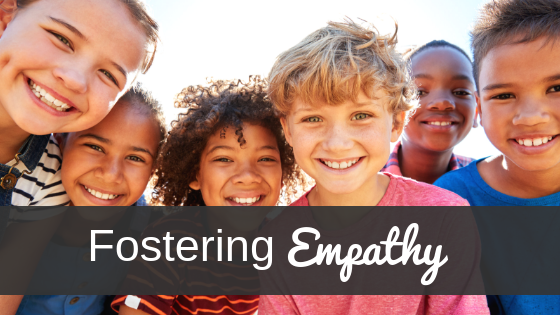Fostering Empathy

As school age children and young adults have returned to school, there are many exciting things to look forward to: renewed friendships, clubs, teams, learning, and a lot of social interaction. Of course, like anything that includes individuals pairing up or grouping up, there will be some friction as different styles, personalities, and backgrounds intermingle. This is not to be pessimistic about human relationships; it is to state a fact of life. Let’s examine some approaches to help our young people find constructive approaches to dealing with conflict.
First, acknowledge to youth that conflict is a part of life to some degree, and most of it stems from people not trying to look at a situation from another person’s perspective. A good technique is to promote this ability as being a positive goal for young people. Empathy is a mark of maturity and intelligence and something that people should be proud of; express to the young ones in your life that it is a highly valuable trait that should be developed and not shunned. Obviously, this concept must be framed in a way that is age appropriate. But cultivating the idea that looking at situations through the eyes of another is something to take pride in sets a great foundation for the future.
Age-appropriate approaches may be helping the very young understand that sharing a game or toy with others is fair – try to get them to think about how they would feel if the other child had the toy and never gave them a chance to play. Discuss with a middle-schooler that those who sometimes act unkindly often do so because deep down they don’t feel good about themselves. This can also be an effective way to foster the awareness that the problem isn’t with your child if they are on the receiving end of a cruel remark or action. Try to build an exchange with a high schooler around the idea (that has floated around social media for some time now) that everyone you meet is dealing with something that you don’t know about. This is a truth that seems to strike an especially powerful chord among many people, and one that can be demonstrated by individuals just looking at their own lives. Because we ALL deal with things about which most people don’t have a clear understanding. This is a conversation that helps a person’s empathetic ability to grow and encourages them to look beneath the surface-level of situations and personalities.
Emphasize to young people that dealing with conflict usually consists of short-term and long-term strategies. Short-term may be to try to have a calm discussion with the person they run into conflict with, an attempt at compromise. But it may also be removing themselves from a situation that is causing them to feel highly stressed or unsafe. Short-term compromises may not be the lasting or most desirable of situations, but they can provide the time and objectivity needed to build more permanent solutions. Longer-term approaches may be to talk to a parent, teacher, or counselor if they feel a situation is continuing to linger. It usually involves a cooperative strategy between the people experiencing conflict. But it may ultimately include the changing of a certain routine, pattern, or even membership in a class, team, or group if they feel that the situation is having a serious detrimental effect on them.
There is no one-size-fits all approach to dealing with conflict, but the most important thing you can let a young person know is that no matter what the situation is with which they are struggling, they can talk to you about it. By showing them that you will listen and be there for them is demonstrating empathy in action. And, of course, the important thing to remember is that you have to make sure you keep this promise!
Connect with us today to learn more about what we can do for you!



